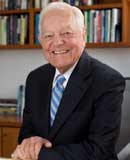Bob Schieffer Discusses the 2016 Debates, Candidates, and Role of the Media

October 28, 2015 — Bob Schieffer, Walter Shorenstein Media and Democracy Fellow, veteran CBS reporter, and former moderator of “Face the Nation,” discussed the nature of the presidential debates, the current field of presidential candidates, and political media in the second event in a series focusing on the 2016 election.
Tom Patterson, Shorenstein Center acting director, opened the conversation by asking Schieffer about the preparation that goes into moderating a debate, as well as the format of debates. “The problem with these debates, where you have 11 people on stage, [is] it’s not conducive to having in any way, shape, or form, a serious discussion of issues…it’s more of a contest to get attention than it is to really say something of substance,” said Schieffer of the Republican debates. This “reality TV show setting” makes it “all but impossible” for any candidate to come off well, including candidates that are more moderate, such as Bush, he said.
Schieffer reflected on his moderation of past presidential debates, which included developing “more questions than you could ever ask.” Six weeks before his moderation of a Romney-Obama debate, he interviewed 26 think tank staffers in order to thoroughly understand a range of issues, and consulted with other reporters; the end result was a list of 300 questions. “I always tried to make sure I knew what I thought were both sides of an issue before I asked somebody about it.”
Some formats are better suited for encouraging substantive conversation, said Schieffer, such as having the moderator and candidates sit at a table, which allows the moderator to make eye contact. Formats that focus too intensely on timing have drawbacks. “I found myself concentrating more on the time than on the questions and trying to listen to the response,” said Schieffer. Town hall meeting formats, where citizens ask questions, are ineffective because the people asking questions are often nervous and “it’s very difficult to do follow up questions,” said Schieffer. “It sounds good on paper, and it sounds like this is really democracy at work, but frankly, it doesn’t work.” A more effective alternative could be for citizens to submit questions to the moderator to ask the candidates, he said.
Despite their flaws, Schieffer still sees great value in the debates. “They probably have more impact than any other single thing during the [campaign] season, including the campaign commercials…public opinion clearly can shift after a presidential debate.”
The role of the moderator, said Schieffer, is not to be a “corrector,” nor is it “up to the press to make the campaign…It’s our role to put the spotlight on the candidates and let them bring out the best and the worst that they have to offer,” he said, and to “give people a better understanding of who these people are.”
Regarding the quality of the candidates, Schieffer said that it has declined in recent years, “not just at the presidential level, but at every level of campaigning.” The Republican field is being led by a “reality TV star and a neurosurgeon that have had no experience in politics” while the Democratic field has “one legitimate candidate” in Hillary Clinton. These trends are symptomatic of a wider public distaste for politics, frustration with the status quo, and the overwhelming influence of money in politics, as Schieffer also discussed in an earlier talk. “I’m not sure Trump is going to get the nomination, but then you look at the list, and you say well if he doesn’t, who is?” Even Jeb Bush and Marco Rubio are polling at 7 and 8 percent, he said.
The media is also undergoing a transition that has implications for the health of democracy. “We’re no longer basing our opinions on the same set of facts,” said Schieffer, as media outlets become more fragmented and partisan. An even bigger crisis can be found at the local level, regarding a lack of sustainable business models. “I feel like national news will take care of itself in some way… if we don’t find some entity that will do what we expect of local newspapers today, we’ll have more corruption in this country than we’ve ever seen,” he said.
Responding to a question about the next generation of political leaders and the media’s role in civic engagement, Schieffer said that the media must emphasize that “the person that you elect to the state legislature really matters. The person that you send to Congress really matters…and they react to public opinion.”
“The disgust and frustration of seeing government that’s basically broken” has turned young people away from politics, said Schieffer, but “we have to get to the next generation and say this is honest work, this is important work, this is something that can really make a difference.” Both journalism and serving in public office, he said, are “a great way to spend your life.”
Hear Schieffer recount memorable moments of moderating the presidential debates between Obama & McCain in 2008, and Obama and Romney in 2012, in the full audio recording, to be posted soon.
Article and photo by Nilagia McCoy of the Shorenstein Center.